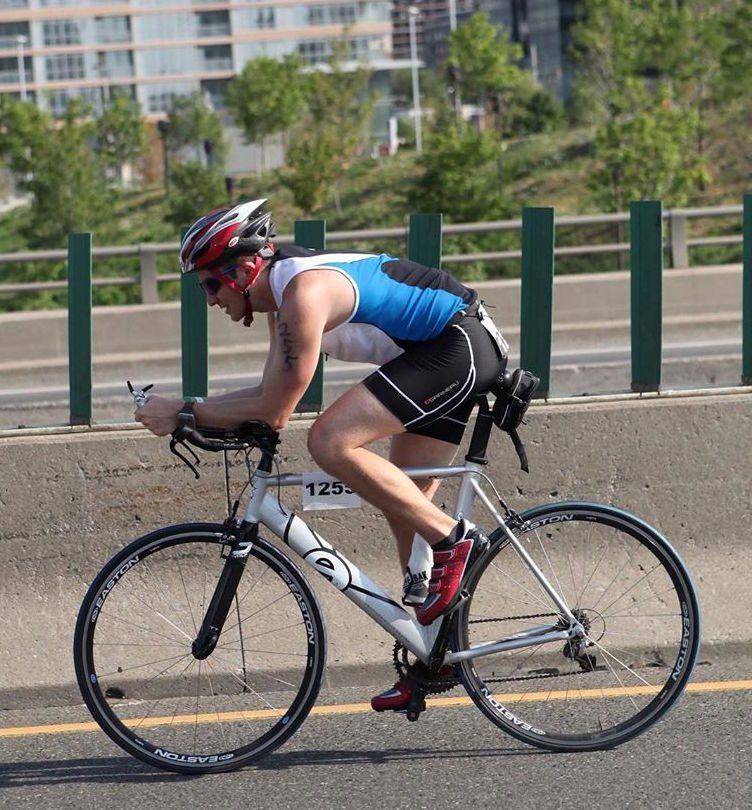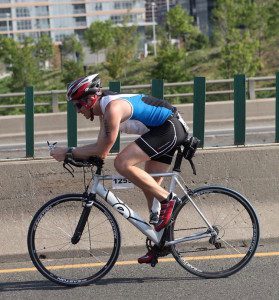Checking in with Duathlete Darren Cooney


We speed up the publication of this interview due to the unfortunate circumstance that Darren Cooney finds himself in. Early this morning, someone stole his trusty 2006/2007 Silver Cervelo Dual (56 cm frame, 11 speed, Easton wheels, Continental tires) out of a locked vehicle as packed and prepared for a morning group workout session. So if you are in the downtown Toronto area, please keep an eye out for anyone trying to unload this bike (seen in the picture above) online or crazy enough to be riding it outside and inform the police. Or if you are able to help Darren out in securing a ride for this season, please let us know.
Darren had a breakout season in 2014, and was arguably the most improved duathlete on the Ontario and National racing scene. He placed ninth overall at the Canadian Duathlon Championship, and fifth overall at the Ontario International Distance Duathlon Championship. We caught up with this emerging duathlon talent who exudes positivity from the core.
TMC: Tell us about your 2014 season. Clearly your best season ever.
Darren Cooney: I had an absolute blast in 2014. I met and exceeded my goals, stayed injury-free and made a number of new friends within the duathlon scene. In a sense, the year was an experiment of sorts, to see what I could do with dedicated training. I’ve always raced without an integrated run/bike program and I loved the feeling of competing in the sport. So I thought to myself, “If I enjoy it this much just fooling around, why not try it a little more seriously?”
TMC: So, why all the success in 2014?
DC: The big difference for me in 2014 is that, for the first time, I trained with a duathlon coach. From past running experience, I know that I get my best results when someone else puts me on a program, which mentally helps me hold myself to account. It also saves me time as I don’t have to create workouts, I just do them. The most significant part of my success is likely from the increase in training volume, in the form of the structured, tailored program from my coach at Ignition Fitness. At an average of six days of cycling or running each week, this is the most time I’ve ever dedicated to a “hobby.” I’m especially relieved that I handled this volume without triggering the stress fractures in my shins that felled me in 2013. As the season progressed, I realized how one’s state of mind can help – or hinder – one’s race. I eventually figured out a mental trick that helped me push through fatigue and race faster. I can’t wait to use it again this spring. As I’ve described on my blog, I went through a period of self-discovery during the five months of the 2014 racing season. I started off at Woodstock a bit tentative and then over the next couple months, gradually realized that, “Wow, I can sort of go fast,” until in the later races I eventually toed the start line alongside the athletes I call “the big guys.” I admire their strength and skill. Now I want to emulate their ability and track them down.
TMC: What’s your sports background? How did you first get involved in Duathlon?
DC: In my youth, I had minimal background in organized sports. I recall competing for the high school volleyball team and not making it past the first try out. Asthma sidelined me from many activities. I’d have to take my puffer after running around the school track once or twice. So the notion of competing and actually winning a medal is somewhat foreign to me. Just after university, I fell into recreational cycling when a friend registered me for the Friends for Life Bike Rally, a six day, Toronto to Montreal fundraising ride. I did that for several years and eventually tried running, first on my own and then through a couple different clinics. I tried my first duathlon on Toronto Island in 2007. On the ferry to the island, a fellow athlete introduced herself and we’ve been friends ever since. Later, in the second run of the race, an official jokingly asked why I was smiling so much. I said to myself, “It’s because I’m actually going to survive this thing and I love it.” My legs hurt for a full month after that race but I was hooked on the sport: friendship and personal growth, what a wonderful combination.
TMC: Are you one of these Du guys that has an eye on Triathlon? Or is it Du to the core? Why? What’s the pull of Du?
DC: I’m a duathlete to the core. I love duathlon. Every race is exhilarating and often, you don’t know how it’s going to end up until the final run, which keeps it interesting right until the end. With duathlon, even though you’re combining only two sports instead of three, there are nearly endless variations on how a race can turn out. You might think that a fast runner has the advantage in duathlon, but if they’re slow on the bike, they can be overtaken and never recover. But on the other hand, a fast cyclist without running speed will be in trouble, especially if they’re not prepared for the brick sensation in the second split. Then there’s transition, where seconds gained and lost can translate into a podium finish. And finally, there’s the huge mental side of the sport, which I’m personally still discovering.
It’s still a niche sport in Ontario and it’s fun to be a part of something unique. That also means the community is small enough that you get to know people at the races. We are part of something that has the potential to grow. I feel only a slight tug to try a triathlon, the same sort of urge many runners likely get when thinking of the Boston Marathon. I think it’s the successful brand of the sport. But I know how much more time would be required to train to truly race a triathlon (or run Boston) and that won’t happen for me unless I drop some other commitments from my life. I don’t want to do that because I think I’ve found the balance that’s right for me.
TMC: We are certainly seeing a big push to make duathlon more prominent in the USA, but why should athletes do the Du?
DC: Why do it? For the beginner, I think duathlon is more accessible than triathlon. You just need a pair of running shoes and a bike. It doesn’t have to be fancy. No worrying about pool time or wetsuits and goggles. For the existing runner or cyclist, making the transition to this sport is easy and it adds variety to what you’re already doing.
That said, duathlon still offers quite the challenge for the more seasoned athlete. This fall, finishing the final 5 km of a half marathon, I thought to myself, “Man, this is so much easier than Lakeside’s international distance duathlon.” That second run is tough and you have to use every ounce of willpower to force your legs to move. For someone that’s already a runner or cyclist, when you add training for a second discipline to the mix, you can get better at your first one.
TMC: What’s the next step for you? You had a bunch ofpb’s this past year, but can we expect you to go faster? What improvements are you looking to make? What’s in store for 2015?
DC: I want to go faster! Next year, I will continue building my strength and technical skills on the bike. For the assertive goal setter like me, the beauty of Sportstats is that you can quantify your progress and compare your abilities to others in the field. Looking at my results, I see an opportunity to improve my cycling. Ideally, working on that discipline will also help me run faster. I’ll then aim for new PBs in my running road races as well as duathlon.
Watch out for the “Smiling Assassin.” I’m aiming for more podium finishes in 2015 and to qualify for the 2016 age group worlds in the Olympic distance format. You’ll see me at several MultiSport Canada races, beginning with Woodstock in June. I’ll also be at the spring Canada Running Series events in Toronto and a fall half marathon. I want to try some new duathlon courses in 2015 and hope to check out venues a little further from the GTA. My racing appetite is bigger than my calendar and my ability to recover, so I’ll likely aim for five duathlons between May and September.
I also want to give back to the athletic community. I think I’m doing it as an Ignition athlete, sharing my story, and I also want to do it by volunteering at a race or by helping someone get into the sport.
TMC: Any tips for new or seasoned athletes reading this?
DC: For newbies, my advice is to just go for it and have fun! Completing a duathlon is a huge accomplishment that sets you apart from the majority of the population. It may be tough, but it will also be addictive and it’s hard to resist coming back for more. Say “hi” to fellow athletes, perhaps at the finish line. A lot of people get chatty there, once they’ve caught their breath. My tip for intermediate and veteran athletes is likely something you already know. You’ll never know how far and fast you can go until you really try.

